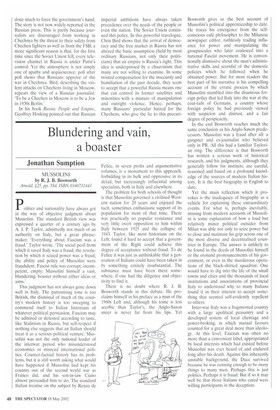Blundering and vain, a boaster
Jonathan Sumption
MUSSOLINI by R. J. B. Bosworth
Arnold, £25, pp. 584, ISBN 0340731443
Politics and nationality have always got in the way of objective judgment about Mussolini. The standard British view was expressed a quarter of a century ago by A. J. P. Taylor, admittedly not much of an authority on Italy, but a great phrasemaker. 'Everything about Fascism was a fraud.' Taylor wrote. 'The social peril from which it saved Italy was a fraud; the revolution by which it seized power was a fraud; the ability and policy of Mussolini were fraudulent. Fascist rule was corrupt, incompetent, empty: Mussolini himself a vain, blundering, boaster without either ideas or aims.'
This judgment has not always gone down well in Italy. The patronising tone is too British, the dismissal of much of the country's modern history is too sweeping to commend itself to Italian historians of whatever political persuasion. Fascism may be admired or detested according to taste, like Stalinism in Russia, but self-respect if nothing else suggests that an Italian should treat it as a serious political venture. Mussolini was not the only national leader of the interwar period who misunderstood economics or misread international politics. Counter-factual history has its problems, but it is still worth asking what would have happened if Mussolini had kept his country out of the second world war as Franco did, and his son-in-law Ciano almost persuaded him to do. The standard Italian treatise on the subject by Renzo de
Felice, in seven prolix and argumentative volumes, is a monument to this approach, forbidding in its bulk and oppressive in its detail, but increasingly influential among specialists, both in Italy and elsewhere.
The problem for both schools of thought is that Mussolini governed a civilised Western nation for 20 years and enjoyed the tacit, sometimes enthusiastic support of its population for most of that time. There was practically no popular resistance and very little overt opposition to him within Italy between 1925 and the collapse of 1943. Taylor, like most historians on the Left, found it hard to accept that a government of the Right could achieve this degree of acceptance without fraud. To de Felice it was just as unthinkable that a generation of Italians could have been taken in by something entirely insubstantial. The substance must have been there somewhere, if one had the diligence and objectivity to find it.
There is no doubt where R. J. B. Bosworth stands in this debate. He proclaims himself in his preface as a man of the 1960s Left and, although his tome is less acerbic than Taylor's, the Anglo-Saxon sneer is never far from his lips. Yet Bosworth gives us the best account of Mussolini's political apprenticeship to date. He traces his emergence from the selfconscious café philosopher to the Milanese newspaper editor, ruthlessly trading influence for power and manipulating the groupuscules who later coalesced into a national Fascist movement. He is conventionally dismissive about the man's administrative skills and scornful of the domestic policies which he followed when he obtained power. But for most readers the best part of his narrative is his compelling account of the erratic process by which Mussolini stumbled into the disastrous foreign policy that led Italy into the war at the coat-tails of Germany, a country whose foreign policy he had previously viewed with suspicion and distrust. and a fair degree of perspicacity.
In the end Bosworth reaches much the same conclusion as his Anglo-Saxon predecessors. Mussolini was a fraud after all: a gangster and ex-journalist who believed only in PR. All this had a familiar Taylorian ring. The difference is that Bosworth has written a serious work of historical research, and his judgments, although they generally follow his instincts, are careful, reasoned and based on a profound knowledge of the sources of modern Italian history. It is the best biography in English to date.
Yet the main reflection which it provokes is the inadequacy of biography as a vehicle for explaining these extraordinary events. For what is, perhaps inevitably, missing from modern accounts of Mussolini is some explanation of how a loud but relatively minor political outsider from Milan was able not only to seize power but to close and maintain his grip across one of the most diverse and decentralised countries in Europe. The answer is unlikely to be found in the deeds of Mussolini himself or the orotund pronouncements of his government, or even in the murderous operations of the black-shirted squadristi. One would have to dig into the life of the small towns and cities and the thousands of local institutions and associations of provincial Italy to understand why so many Italians found it in their interest to accept something that seemed self-evidently repellent to others.
Inter-war Italy was a fragmented country with a large apolitical peasantry and a developed system of local clientage and power-broking, in which mutual favours counted for a great deal more than ideology. At this level, Fascism was often no more than a convenient label, appropriated by local interests which had existed before Mussolini was ever heard of and endured long after his death. Against this inherently unstable background, the Duce survived because he was cunning enough to be many things to many men. Perhaps this is just politics. Perhaps it is fraud. But if so it may well be that those Italians who cared were willing participants in the deception.














































































 Previous page
Previous page